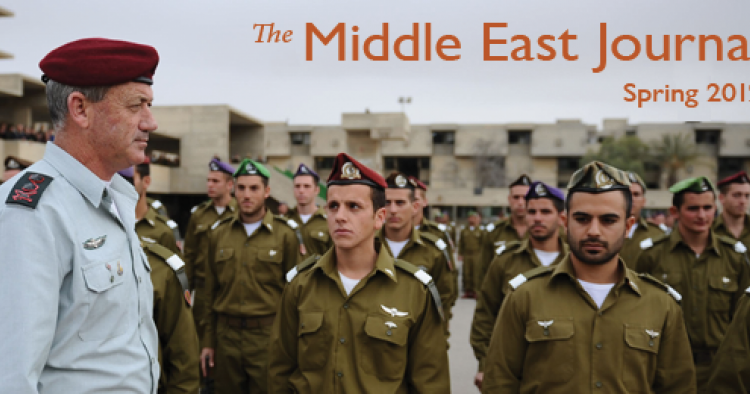The Spring 2012 issue of the Middle East Journal is now online at IngentaConnect and ready for members to read (free with your membership with MEI). The print edition will also be shipping soon. To access the Journal online, use our guide to activate your access through IngentaConnect.
Articles in this issue:
- “Continuity and Change in the Social Background of Israel’s Military Elite,” by Oren Barak and Eyal Tsur. These authors, working with a database that they compiled, present a discussion of the personal backgrounds of high-ranking officers in the Israel Defense Forces (IDF).
- "The Potential Impact of Palestinian Nonviolent Struggle on Israel: Preliminary Lessons and Projections for the Future," by Omri Arens and Edward Kaufman makes the argument that a "massive, organized, and sustained nonviolent Palestinian resistance" has the best chance of success for Palestinians seeking to establish a Palestinian state.
- "Factors Influencing Military-Media Relations in Turkey," by F. Michael Wuthrich. This article examines the sometimes cozy and sometimes contentious relationship between the Turkish Armed Forces (TAF) and Turkey's mass media, seeking to explain the factors behind the TAF's "informal mechanisms of power."
- "Democratic Islamization in Pakistan and Turkey: Lessons for the Post-Arab Spring Muslim World," by Juris Pupcenoks looks at two previous case studies, Pakistan and Turkey, and extrapolates some lessons applicable to Islamist political participation in Egypt, Tunisia, and other countries affected by the "Arab Awakening."
- "What the Social Sciences Can Tell Policy-Makers in Yemen," by Robert E. Mitchell emphasizes a theme that is close to our core mission here at the Middle East Institute: understanding the importance of a thorough and nuanced understanding of a country’s social and cultural context as critical tools in the formation of policy.
The book review article in this issue, by As’ad Ghanem, deals with five recent books on Palestinians in Israel within the Green Line, the people usually referred to as Israeli Arabs, and their changing roles and attitudes.
The Middle East Institute (MEI) is an independent, non-partisan, non-for-profit, educational organization. It does not engage in advocacy and its scholars’ opinions are their own. MEI welcomes financial donations, but retains sole editorial control over its work and its publications reflect only the authors’ views. For a listing of MEI donors, please click here.













